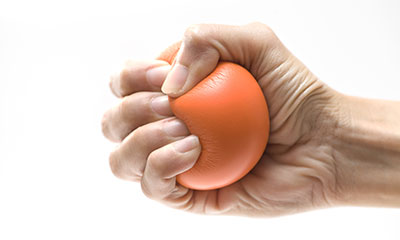Exercise and Brain Power: Work Your Muscles to Strengthen Your Mind

Exercise and brain health are closely connected. That’s because your brain, like the muscles in your arms and legs, is strongest when you exercise regularly. And while there’s no machine in the gym to work your brain, it still reaps the benefits of physical activity.
Raising your heart rate perks your brain up, too. And moving your body is good for your weight and great for your memory. The brain benefits come from the increases in blood flow and oxygen that comes from regular exercise.
With lots of available blood and nutrients, your brain is fueled for optimal performance. Daily movement also allows new brain cells to develop while reinforcing neural pathways. Your memory improves through exercise, and physical activity helps maintain your cognitive health as you age.
Ready to up the intensity of your daily exercise to maximize your brain power? Start by checking out all the ways physical activity supports your brain health.
Science of Exercise and the Brain
Current research establishes the link between regular exercise and better brain function. As little as 30-to-45 minutes of movement each day is enough to trigger a cascade of memory-preserving benefits. Explore the five ways working out can support your cognitive skills.
1. Exercise Increases the Size of the Hippocampus
The area of your brain responsible for learning and verbal memory is called the hippocampus. When you exercise, your hippocampus increases in volume. It literally grows. Neurons in the hippocampus become denser, and connectivity in the region is reinforced through your physical activity.
The hippocampus is the first region of your brain to dull with age. Exercising regularly helps keep it sharp and protects it from the normal, age-related decline.
Exercise also ramps up activity in this memory and learning center. Just 10 minutes of mild-to-moderate exertion is enough to strengthen the connection between neurons and the memory-focused section of the brain.
This improved connectivity in the hippocampus can lead to better performance on memory and cognitive skills tests. Short spurts of exercise—which may fit better in your busy life anyway—can even boost recall. This could include remembering where you parked your car, or what appointments you have during the day. Think about your hippocampus and all the good you are doing it the next time you hit the gym.
2. Working Out Reduces Stress Hormones that Inhibit Brain Activity

Many people seek solace from stress in a walk or jog. If you’re stressed, your brain is, too. And exercise is a powerful tool for relaxing your mind.
Physical activity reduces the stress hormones (cortisol and norepinephrine specifically) that build up in your brain when you’re worried and anxious. Too many stress hormones can make you feel sluggish and contribute to brain fog. This can even slow your cognitive skills and dampen brain power.
Bust through the haze of stress by planning regular exercise. The endorphins released in your brain after exercise clear away stress hormones and boost your mood. Exercise and endorphins also stimulate growth in the hippocampus—as you learned above.
Your brain and body need exercise to relax. Think clearly and improve your mood by prioritizing regular exercise.
3. Sleep Improves With Exercise
Another way exercise improves your mind is by helping you sleep well at night. Challenging your body every day makes it easier to fall asleep. And it leads to the kind of sleep that helps you feel rested and recharged come morning.
Restful sleep also improves mental clarity and executive function. You need good sleep to focus, make decisions, and process your emotions. It provides much-needed time off for your brain to rest and prepare for the day ahead—even though your brain still does work during sleep. Your brain is at full capacity after a good night’s sleep. Cognitive skills are sharpened and memory is reinforced. Start working out for the sake of your sleep and the strength of your brain.
4. Aerobic Exercise Triggers the Release of Growth Factors
Your memory relies on the neural pathways and connections deep inside your brain. Proteins called growth factors are necessary for your mind to create new connections and reinforce old ones. Lucky for you, regular exercise is an easy way to increase the amount of growth factors available in your brain.
Moving your body triggers the release of a protein called brain-derived neurotrophic factor (BDNF). This protein helps your brain generate new cells and preserves aging ones. BDNF is also responsible for developing new blood vessels in and around the brain. This allows more nutrient and blood circulation in the area.
If you want to help your brain grow and receive the blood and nutrition it needs, start moving. BDNF levels increase whenever your exercise, even for a few minutes. That means giving your brain support only takes a few minutes of activity.
5. Regular Movement Slows Aging of the Brain

Growing older doesn’t mean your brain has to slow down. There are lifestyle measures you can take now to preserve your memory and keep your mind sharp. A lifelong habit of regular exercise can help you keep a healthy brain later in life.
A study of the tie between memory and exercise illustrates this well. Research shows older adults who exercised consistently in their youth outperformed their peers on memory and cognitive skills tests. Their scores matched most closely with other test takers up to 10 years younger.
Since you are only as old as you feel, keep your body and mind feeling young by prioritizing regular exercise throughout your life.
Pick Either Aerobic and Anaerobic Exercise for a Healthy Brain
Your brain isn’t too picky about the exercise it needs to thrive. All you need to do is ramp up blood circulation to start seeing improvements. Like you learned above, the brain benefits of exercise come from increased blood flow to the region.
High-energy activities like tennis, cycling, swimming, and soccer elevate your heart rate above its resting norm. These movements are considered aerobic exercise and are great at quickly moving blood through your body. Aerobic exercise and brain health go hand in hand. Fast-paced movements increase blood flow in your head and neck, supplying your brain with plenty of oxygen and nutrients.
But it doesn’t have to be all aerobic exercise all the time. Anaerobic exercises produce similar brain-boosting results. Resistance movements and strength training are also great ways to work out for your brain.
You don’t even have to go all out for your brain to see benefits. Activities like yoga, tai chi, and other low-impact sports hone your concentration skills and focus while lowering stress levels.
Variety of movement is great for your body and brain. Developing multi-faceted workouts that include strength training, balance, low-impact, and aerobic movements should be your goal.
See this relationship in action yourself. Protect the health of your brain and body with regular physical activity. Exercise daily and notice how your brain responds.
References
https://www.health.harvard.edu/staying-healthy/exercising-to-relax
https://time.com/4474874/exercise-fitness-workouts/
https://n.neurology.org/content/86/20/1897
http://aassjournal.com/browse.php?a_code=A-11-515-1&sid=1&slc_lang=en
https://health.clevelandclinic.org/why-exercise-protects-your-brains-health-and-what-kind-is-best/
https://www.scientificamerican.com/article/how-exercise-affects-your-brain/
https://www.psychologytoday.com/us/blog/the-fifth-vital-sign/201901/why-exercise-is-good-your-brain
https://www.sciencedaily.com/releases/2020/02/200203104450.htm
https://centerforinquiry.org/blog/why-exercise-is-good-for-the-brain/











